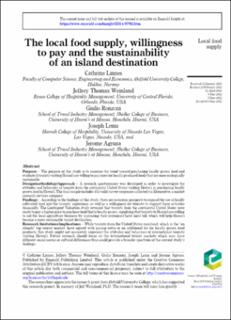| dc.contributor.author | Linnes, Cathrine | |
| dc.contributor.author | Weinland, Jeffrey Thomas | |
| dc.contributor.author | Ronzoni, Giulio | |
| dc.contributor.author | Lema, Joseph | |
| dc.contributor.author | Agrusa, Jerome | |
| dc.date.accessioned | 2022-09-05T13:46:56Z | |
| dc.date.available | 2022-09-05T13:46:56Z | |
| dc.date.created | 2022-08-06T23:17:59Z | |
| dc.date.issued | 2022 | |
| dc.identifier.citation | Journal of Hospitality and Tourism Insights. 2022. | en_US |
| dc.identifier.issn | 2514-9792 | |
| dc.identifier.uri | https://hdl.handle.net/11250/3015849 | |
| dc.description.abstract | Abstract Purpose – The purpose of this study is to examine the trend toward purchasing locally grown food and evaluate if tourists visiting Hawai’i are willing to pay more for locally produced foods that are more ecologically sustainable. Design/methodology/approach – A research questionnaire was developed in order to investigate the attitudes and behaviors of tourists from the continental United States visiting Hawai’i in purchasing locally grown food in Hawai’i. The final sample includes 454 valid survey responses collected via Momentive, a market research services company. Findings – According to the findings of this study, there are economic prospects to expand the use of locally cultivated food into the tourists’ experience, as well as a willingness for tourists to support these activities financially. The Contingent Valuation study revealed that tourists from the continental United States were ready to pay a higher price to purchase food that is locally grown, signifying that tourists to Hawai’i are willing to aid the local agriculture business by increasing their restaurant/hotel meal bill, which will help Hawai’i become a more sustainable tourist destination. Research limitations/implications – While tourists from the United States mainland, which is the “an islands” top tourist market, have agreed with paying extra or an additional fee for locally grown food products, this study might not accurately represent the attitudes and behaviors of international tourists visiting Hawai’i. Future research should focus on the international tourist markets which may have different social norms or cultural differences thus could provide a broader spectrum of the current study’s finding | en_US |
| dc.language.iso | eng | en_US |
| dc.publisher | Emerald | en_US |
| dc.rights | Navngivelse 4.0 Internasjonal | * |
| dc.rights.uri | http://creativecommons.org/licenses/by/4.0/deed.no | * |
| dc.subject | sustainable food consumption and production | en_US |
| dc.subject | consumer behavior | en_US |
| dc.subject | tourist perceptions | en_US |
| dc.subject | economic sustainability | en_US |
| dc.subject | willingness to pay | en_US |
| dc.subject | Hawai’i | en_US |
| dc.title | The local food supply, willingness to pay and the sustainability of an island destination. | en_US |
| dc.type | Journal article | en_US |
| dc.description.version | publishedVersion | en_US |
| dc.rights.holder | © Cathrine Linnes, Jeffrey Thomas Weinland, Giulio Ronzoni, Joseph Lema and Jerome Agrusa. | en_US |
| dc.source.journal | Journal of Hospitality and Tourism Insights | en_US |
| dc.identifier.doi | 10.1108/JHTI-01-2022-0031 | |
| dc.identifier.cristin | 2041463 | |
| cristin.ispublished | true | |
| cristin.fulltext | original | |

